If you are just getting started on Twitter, you might find this calendar, created by Sarah Kaiser, of educational chats useful. Click on the Google Calendar icon at the bottom of the calendar to subscribe.
Education ∪ Math ∪ Technology
If you are just getting started on Twitter, you might find this calendar, created by Sarah Kaiser, of educational chats useful. Click on the Google Calendar icon at the bottom of the calendar to subscribe.
Michael Doyle, a science teacher, has posted a critique of calculator use in math class on his blog.
My response:
See this is interesting, because I have a strong number sense and I never grew up with an abacus.
I did spend hours and hours playing with numbers with my calculator. I would add/subtract/multiply/divide them and look for patterns. I was able to look for patterns into big, big numbers, because the speed at which I could calculate wasn’t limited by the tool I was using.
What’s missing from current instruction is actual time using the calculator to play around and construct one’s own notion of numbers. Just like you want kids "doing science" they don’t get enough time "doing math." The calculations are not the math, anymore than the list of content expected by your state curriculum in science is the science.
There is not enough time spent ensuring kids understand concepts, and too much time kids "cover a broad curriculum."
The issue is not the technology being used to do the calculations, as the abacus is a visual & kinesthetic tool, while the same holds true of the calculator (you do have to press the buttons after all). The issue is that students do not get enough time in math do more than memorize rote facts, and almost never get exploration time.
I’m looking for feedback on the document started below. What recommendations would you make to change teacher education programs?
Objective
Put some thoughts together on the implications of the technological literacy of students arriving at our schools for both teacher education and professional practice. What do our teacher education programs need to do to prepare teachers to teach kids who arrive at school knowing how to make movies? What new thinking do we need about how we educate teachers in preparation for certification and how teachers currently holding certificates need to direct their life-long learning?
5 out of 9 of the colleges in British Columbia have an optional educational technology course already as of January 2010. See this spreadsheet for details. No colleges require educational technology be learned by teachers, although some colleges do at least require some use of technology by teachers.
Two main ideas:
1. Teach teachers how to use specific technologies
2. Teach teachers why they would want to use technology in the classroom
As with any other skill in teacher education programs, the use of technology by teacher candidates varies greatly.
A variety of different technologies should be included as access to any given technology may be limited at schools. Some schools limit access by policy intended to safeguard children and/or monitor teachers. Other schools have limited access because of budgetary concerns. Either way, teachers may not have full access to their preferred choice of technology, so they should know enough technology that they can use it flexibly.
Given the importance of technology in today’s world, teachers should understand the purposes of educational technology, and how to incorporate it into their classroom practice. Relatively simple processes, like the SECTIONS framework (Bates and Poole, 2003, see this PDF for an example implementation), can be used to evaluate new technologies and decide on their utility in a classroom setting.
Educational technology, just like other technologies, is rapidly changing, following the trend of the exponential change in technology as per Moore’s Law. This means that, in order for teachers (and by extension schools) to remain current, teachers must be able to learn new technologies and make decisions about whether they will be useful. Teacher education programs must prepare teachers not just to use today’s technology, but how to learn the technology of
tomorrow.
Further, technology exists today that is freely available and easy to use, which allows teachers to connect with each other like never before. Social media has the potential to break down the walls of the classroom and provide teachers with the opportunity to share their practice widely. Teachers should learn how to use social media as it is not only a way for them to keep current in their practice, it is also a way for the already existing excellent practices in education to spread. Just as it is the expectation that doctors will keep themselves current by connecting with other medical professionals in the field, so too should educators.
Educators need to learn how to share their ideas openly. For example, the use of Creative Commons licensing, should be wide-spread in our profession so that, while attribution remains similarly important, we can ground the existing sharing of materials in a supportive legal framework.
However, without knowing the history of educational technology, teachers are more likely to fall into the same pitfalls as others before them. It is easy to use technology in a classroom and have a room full of students who are actively engaged in pseudo-learning rather than real learning. Technology used only for the purpose of engaging or entertaining students is not a good use of technology, nor an example of good teaching practices.
It is important that the use of educational technology be grounded in good pedagogy. Teachers need a deep understanding of constructivism before they can use technology effectively as a constructivist tool for learning. Teachers need to understand that just being exposed to an idea does not mean that students will learn it, and the same is true of technology. The use of multimedia in classrooms has traditionally been to deliver content (or to entertain students) and teachers should recognize the power of multimedia to enhance the understanding of students, but also the danger in changing one ineffective practice (lecture) into another ineffective practice (video lecture).
Teachers should learn about how to facilitate the student use of technology so that students, who are often exposed to the language and vocabulary of technology at an early age, are able to actively use technology rather than just be passive recipients of the teacher’s use of technology.
José Romão created a document from a thread on Quora, in an effort to generate more thoughts on how one can become a good teacher. We are planning on getting as many ideas as we can, extending the ideas in more detail, and either creating a short "this is how you can become a better teacher" book or presentation.
Add some of your ideas here on how you think people can be more effective classroom teachers.
I’m using the following xkcd comic to help the teachers at my school with their password selection.

There is also a very useful script, created by Steve Gibson, available to test how long it would take a brute force attack to figure out your password with a computer. While I don’t recommend entering any actual passwords you intend to use into an password strength checker (there aren’t that many websites out there, so an hacker could easily steal the passwords you enter into their "password" checker and try them all over the place, thanks to @drdouggreen for the reminder), this can be an excellent way to experiment with different types of passwords.
I also recommend reading this post I wrote about how to change your password for every service you use, without having to memorize a new password for each of them.
As suggested above, we’ve spent many years training people to use complicated passwords which are actually not all that secure, when instead, you can use a longer, much easier to remember, password that is much more secure.
I love using Geogebra! Take a look at the diagram below (use the slider to change the value of n) and then think about how difficult this one simple interactive diagram would be to recreate without the technology.
For more Geogebra resources, either check out the official Geogebra website (http://www.geogebra.org/) or the awesome resources shared below to get a feel for what you can do with Geogebra.
http://www.ualberta.ca/~urban/Projects/Math/Tech%20in%20Math.htm by @stefras
http://mrhonner.com/2011/06/19/pendulum-animation/ by @MrHonner
http://www.geogebra.org/en/upload/index.php?&direction=0&order=&directory=english/Daniel_A_Kaufmann by @dak721
This video of Michelle Bachmann complaining about Mathematics education is just wrong.
My take-away from this video is that Michelle Bachmann has a fundamental misunderstanding of what constructivist teaching is. She doesn’t get it. To be honest though, when you look at educational materials which are shared with parents, they very rarely, if ever, define the purpose behind the pedagogy in language that is accessible to people outside of the field of teaching.
My thought is that we need to define some of the terms we use in language which makes sense for the average person. For example, the definition of Constructivism on Wikipedia is:
Constructivism is a theory of knowledge (epistemology) that argues that humans generate knowledge and meaning from an interaction between their experiences and their ideas.
This definition is problematic, not because it is inaccurate, but because it is incomprehensible to a non-academic. It comes across as knowledge is arbitrary.
A few weeks ago, I asked people to attempt and define constructivism themselves (in 140 characters or less) via Twitter. Here are some of the definitions.
A belief that knowledge exists in and is constructed by the mind of the learner, not transmitted from outside. @MathEdNet and @Wedaman
Making meaning and building understanding starting from what you already know. @josieholdford
Learning is the result of our individual experiences & the social support given around those experiences. @delta_dc
Making meaning and building understanding starting from what you already know. @pwacmdh
Learning is the result of our individual experiences & the social support given around those experiences. @mssandersths and @bonzimmer
While these meanings may not be enough to explain constructivism to parents in enough detail, they are more comprehensible to the average person, and a much easier place to begin a conversation about what the impact the Constructivist learning theory has on how we should approach education.
This xkcd comic demonstrates a big problem with averages.
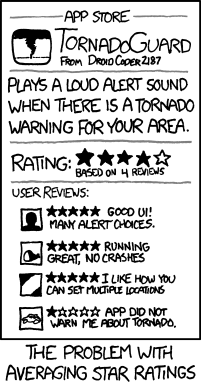
By the way, this same problem occurs when you average grades as well.
I tried a little experiment today with Google. I started by typing "learning is " into Google and waiting to see what the auto-suggest feature would come up with.
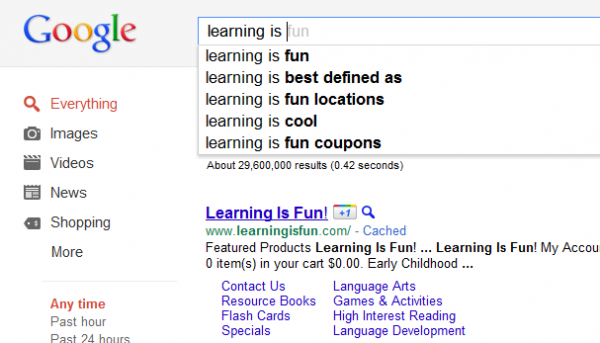
Next, I typed "Teaching is " into the auto-suggest.
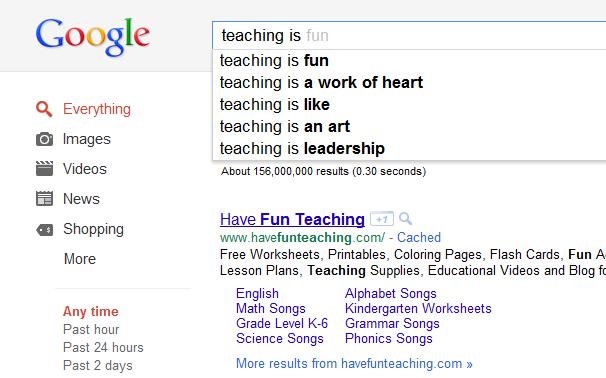
Finally, I typed "Schools are " into Google.com.
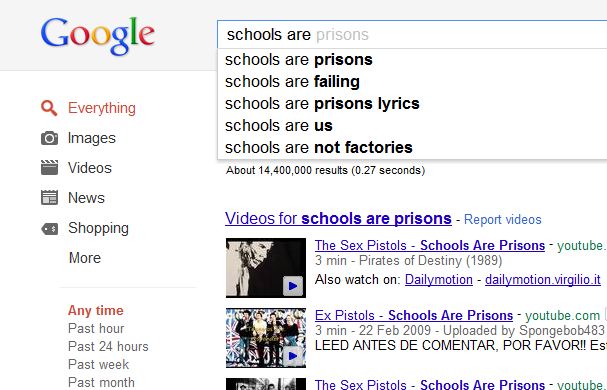
As I understand it, Google pulls the auto-suggest phrases from the most commonly typed search phrases people use. In other words, the auto-suggest phrases represent the opinions of people using the Google search engine.
Now while I think lots of schools are fun, and it would be wrong to characterize most schools as prisons, at the very least we have a marketing problem. One would assume that if people think learning is fun, and teachers think teaching is fun, then the institutions where both of these things happen should be fun, right?
Why then do the search results above come up? Is everyone searching for the song "Schools are prisons" by the Sex Pistols? Or do we have a larger problem?
Update: @sjhughes shared this one. Google "school makes me" and you’ll see some more opinions of students about school.
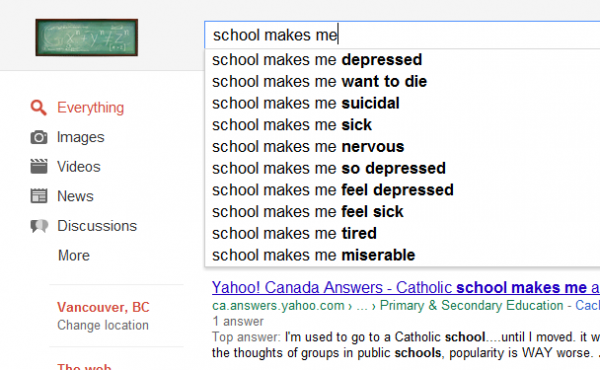
I read a great post this morning from Mary Beth Hertz ( @mbteach ) where she shares her insight on her problem with the KIPP and Mastery charter schools. In her article she says:
OK, I get it. KIPP works, Mastery works. But are they really offering the choices they claim they offer to students and families in Philadelphia? If they’re so similar, what’s the choice there? ~ Mary Beth Hertz
The problem is, when you only use one way to judge the success of a school (external test scores), you prevent real innovation from happening. Every school starts to look more similar rather than having freedom to try out different solutions to the "education problem", because each school has to turn out the same product. There are only so many ways you can produce kids when you have single measure of the quality of their education.
In a true market approach to schools, you would let the market decide what accountability measures the consumers want. Since this seems so obvious to me, it is clear that the reformers pushing standardized tests as the only effective measures of schools do not actually want a free market approach to schooling. In fact, the very notion that we should think of kids as being products produced by a factory-like system is nauseating to me.
This problem is exasperated by the fact that in almost all school districts in Canada (and the US, UK, and Australia), the curriculum the kids are expected to cover looks exactly the same. Again, if you want schools to have the freedom to experiment with different models of education, standardizing the curriculum means they have much less choice on what they offer.
At my school we are fortunate. For our 11th and 12th grades, our students are essentially exempt from covering the British Columbia curriculum. We’ve gotten this waiver because we use the International Baccalaureate curriculum, and the BC Ministry of Education presumably considers this curriculum rigorous enough. We do have a couple of requirements from the BC Ministry for our students, but these are easily covered through our program.
In British Columbia overall, we actually have a tremendous amount of choice for our students. When we were looking around for schools for my son, we found Montessori schools, democratic schools, unschools, fine arts schools, and lots of other types of schools, which are all publicly funded.
When organizations like the Fraser Institute started ranking schools by their standardized test scores, and then further suggest that teachers should be judged by these same scores, and then in the same breath recommend school choice, you have to start wondering what their real aim is.
Standardized curriculum, and standardized testing are the antidote to school choice, not the solution.